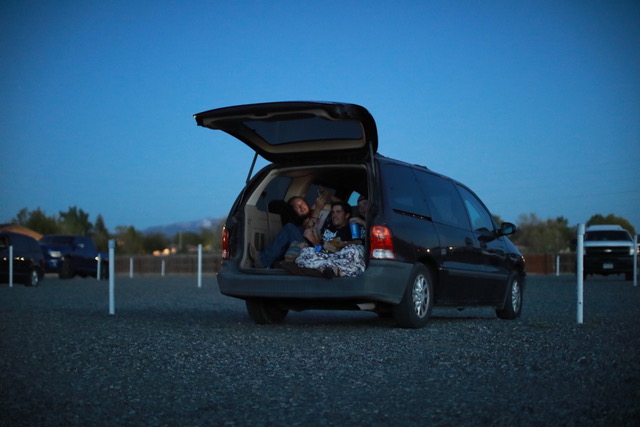Social distancing, homemade French fries, tie-dye, grad night, family tradition & the Star.
All photos © Micah Garen & Marie-Hélène Carleton/Four Corners Media
After being shuttered for two months following Colorado’s shelter-in-place orders, the Star Drive-In in Montrose, the oldest drive-in movie theater in the state, cautiously reopened on a Friday night in May. As the sun set on a half-full parking lot, Sonic the Hedgehog lit up the screen.
The owner, Pam Friend, has been running this drive-in her whole life, picking up where her parents—who started it seventy years ago—left off. She is eloquent about the role of movies as a central part of American culture. “Drive-ins are about nostalgia,” she says—and now they are about our COVID-19 world. Due to social distancing, drive-ins have seen a resurgence in relevancy and interest.








There are around 330 drive-in movie theaters left in the US, a lot of them in rural parts of the country. The Star Drive-In is a central part of the culture in Montrose. On opening night, we met one family who has been coming to the drive-in for thirty-seven years to watch the Friday night movie. In the beginning, they would bring their infant son, who would sleep on the seat between them. This time, he sat in a car with his own family, continuing the tradition.
In order to reopen, and stay open, Friend instituted strict social distancing guidelines. She removed the speakers you would attach to your car; instead, everyone tunes into a radio station to listen to the movie. No tailgating, formerly a favorite of drive-in moviegoers—everyone has to sit in the cab of the truck, not the bed. Only one person per car at the concession stand, six feet apart, no one can walk around, and everyone has to wear a mask. Loyal followers showed up, as well as people desperate to get out of their homes. But Friend also faced some strong negative reactions from people who criticized her safety measures as too much and too strong.







Since May, the rules have become more flexible, but Friend and her team, clad in bright tie-dye T-shirts, monitor social distancing closely as they work the limitations of this new world. The Star Drive-In has hosted a census sign-up evening, a graduation night to celebrate seniors from Montrose High School and is set to screen the Garth Brooks live concert playing at drive-ins across the country.
The Star Drive-in has been through a lot in past seventy years. It survived a tornado that blew down the screen, prompting a local radio announcer to say, tongue in cheek, that they were going to be playing Gone with the Wind. They also weathered the 1980s, which featured a lot of drunken fighting and smashed walls, and the costly transition to digital projectors. Despite the hope and hype of drive-ins as the next new thing, Friend is concerned about the future and her ability to stay open. The biggest challenge with COVID-19 comes from the film studios themselves: major studios are now sending their films straight to on-demand viewing, which means Friend doesn’t have the same selection of first-run features to attract an audience.






But turnout has continued to go up, and Friend remains hopeful. The concession stand—which includes homemade French fries from potatoes that Friend grows herself and burgers that are the “best in town”— is a big draw. And even for Gen Z, the drive-in is still a big draw. As one graduating senior put it, they came “to see movies the retro way.”—Marie-Hélène Carleton
This project was made possible with a grant from the National Geographic Society.
Marie-Hélène Carleton is an award-winning documentary filmmaker. Most recently, she has directed five documentaries for Al Jazeera English, one of which won Best News Documentary at the 2014 Monte Carlo Festival of Television and Film. Her recent short film about the refugee crisis, “Light on the Sea,” launched in March on VanityFair.com and The Scene. Her short film about the 2011 Egyptian uprisings in Tahrir Square, “Four Women, One Revolution,” won the Women and Girls Matter award for Media that Matters. Her film work has appeared on Al Jazeera English, Vanity Fair, BBC America, The New York Times, the Financial Times, HDNet’s World Report and Granta, among others. She is a member of Film Fatales and has been awarded artist fellowships at the MacDowell Colony and the Ucross Foundation. She was selected to participate in the inaugural Film Independent Documentary Lab in Los Angeles and the IFP Documentary Film Lab. Carleton’s work can be found at instagram.com/mhcarleton/ and fourcornersmedia.net.
Micah Garen is an award-winning documentary filmmaker and journalist who has worked in conflict and post-conflict zones for the past fifteen years. Most recently, he has directed five feature-length films for Al Jazeera English, one of which won a Golden Nymph for Best News Documentary at the 2014 Monte Carlo Television Festival. His work has been published by Al Jazeera English, The New York Times, The New York Times Magazine, Vanity Fair, Newsweek and the Financial Times, among others. His recent short film about the refugee crisis, “Light on the Sea,” launched in March on VanityFair.com. His short film from Afghanistan, “Call Me Ehsaan,” was a New York Times Op-Doc editor’s choice and screened at festivals. Garen filmed the Christmas Eve Raid scene in Iraq that was part of Michael Moore’s Fahrenheit 911. In 2004, Garen and his interpreter, Amir, were kidnapped while filming in Nasiriyah. They were held for ten days before being released. Their story is chronicled in the dual memoir with Marie-Hélène Carleton, American Hostage, published by Simon & Schuster in 2005. The memoir received starred reviews on both Kirkus and Publisher’s Weekly. Garen’s work can be found at instagram.com/micahgaren and fourcornersmedia.net.


FASCINATING AND WELL DONE AND A RELIEF TO HAVE GOOD NEWS AND VIEWS IN THE PANDEMIC.